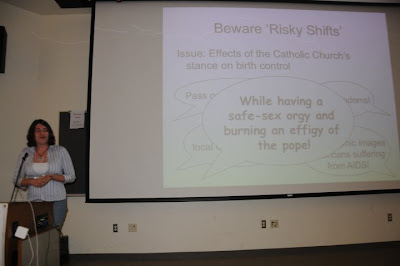My mom just sent me this to aid in my Blogathoning, with the note “Believe it or not, that first word is “Bob” in Greek…” I’m half Greek, though you may not realize that from my name – Jennifer McCreight doesn’t exactly have the same ring to it as Crissoula Papadapolopolis. My Papou (Grandpa) was born in Greece, and my Yia Yia (Grandma) grew up there. Since we live about ten minutes from them (think My Big Fat Greek Wedding), I’ve been raised in Greek culture. Except I’ve always failed at one thing:
I’m half Greek, though you may not realize that from my name – Jennifer McCreight doesn’t exactly have the same ring to it as Crissoula Papadapolopolis. My Papou (Grandpa) was born in Greece, and my Yia Yia (Grandma) grew up there. Since we live about ten minutes from them (think My Big Fat Greek Wedding), I’ve been raised in Greek culture. Except I’ve always failed at one thing:
The language.
My family tried to teach me. When I was little Yia Yia taught me little things – how to count, names of body parts, names of food – but I’ve forgotten almost all of it from disuse. I visited Greece when I was 12, and they bought me what was effectively a “Baby’s First Book” in a last ditch attempt to teach me Greek. At that point I could read Greek letters but had no idea what the words I was saying meant. Now I can’t even do that much.
Looking back, I wish they had taught me more when I was younger able to absorb it. My grandparents were effectively my daycare service, so they could have easily talked Greek around me while my parents spoke English. And then I would have had some of the pronunciations that are specific to Greek that I simply can’t do as an adult. My grandparents and mom still giggle when I fail to say “gala” (which means “milk”) correctly. I can’t do the guttural “g” it requires.
My dad and I even have purposeful bastardizations of certain phrases we can’t pronounce quite right:
“To your health” – stinygiasou – skinny asses
I know the pet names – my grandparents calls me koukla (“little doll”) and my mom calls me zuzuni (“little bug” – don’t ask). I picked up the inappropriate words too – I probably know more Greek synonyms for poop and fart that I do useful phrases. I can still say some things out of rote memorization: “I love you,” “Good night,” “You’re welcome.” My Yia Yia and I even have a little script we go through on the phone:
Yia Yia: Ti kaneis? (“How are you?”)
Me: Kala (“Fine.”)
But I don’t know how to say anything else. I don’t know how to admit I’ve had a bad day, I’m sad, I’m angry… Which is oddly representative of my relationship with my grandparents. I love them so much that they’re not allowed to know I’m not fine sometimes. I don’t want to upset them, which is why they’re probably the only two people on the planet who don’t know that I’m an atheist.
Odd how language represents that.
This is post 8 of 49 of Blogathon. Pledge a donation to the Secular Student Alliance here.





